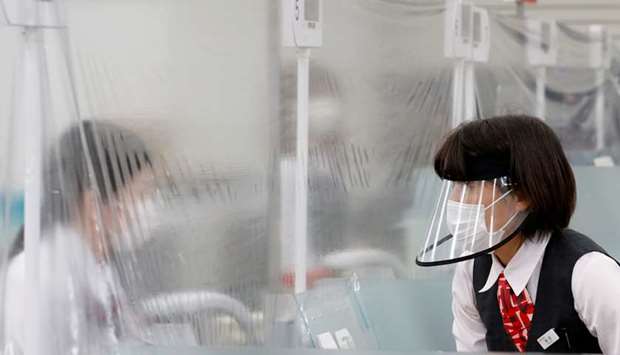The coronavirus pandemic is forcing changes in Japan to the way economic data is collected and some government agencies meet, rare moves in a country where tradition plays a strong part in everyday life.
The internal affairs ministry that compiles inflation data usually sends out about 700 staff to supermarkets and other retailers across the nation each month to check price tags for goods and conduct face-to-face interviews with shop clerks.
That team of data gatherers will now rely more on phone calls to ensure their safety, said Naruhiko Yamagata, head of the ministry’s division compiling the consumer price index (CPI) data.
“We pick up data online if we can, but for some items we need to obtain them from shops,” he said. “To avoid human contact as much as possible, we’re introducing phone surveys in some cases and trying to be as flexible as we can in getting data.”
The changes will not affect the type and number of samples consisting the CPI or the accuracy of the data, Yamagata said. They would instead bring Japan closer into line with many other economies, including the United States, which already relies on a combination of phone calls, online research and store visits. Japan is faring better than some countries, where stricter lockdowns have forced many retailers to close.
Prime Minister Shinzo Abe last week expanded a state of emergency to make it nationwide, giving authorities more power to push people to stay home and businesses to close as the coronavirus outbreak in the country spread. Japan had recorded 12,472 cases of Covid-19 and 328 deaths as of yesterday, according to public broadcaster NHK. However, the country’s social distancing measures still rely on voluntary co-operation of citizens and businesses, leaving them far short of the strict lockdowns in place in other countries.
Still, several Japanese government agencies, which have generally been reluctant to make changes to their traditional ways, have embraced technology amid the outbreak.
The Bank of Japan held its quarterly regional branch managers’ meeting in April via teleconference for the first time, responding to the government’s social distancing policy.
Some government ministries are conducting media briefings via tele-conferences, while others are issuing press releases via e-mail instead of direct hand-outs at press clubs.

A staff member wearing a face shield talks to a bank teller at a counter where a plastic curtain is installed in order to prevent infections following the coronavirus disease outbreak, at the Higashinakano branch of MUFG Bank in Tokyo, Japan.
